Month 13:22, Week 3:7 (Shibi'i/Sukkot), Year:Day 5945:376 AM
2Exodus 8/40
Gregorian Calendar: Tuesday 17 March 2022
Book of Revelation XV
Between the Present & the Future II
Clement & Ignatius, the Judaising Heresy & Hyper-Grace
Second Expanded Edition, 25 March 2022
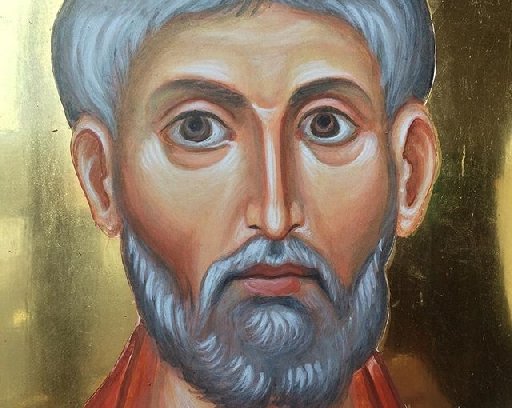
Continued from Part 15
Introduction
Shabbat shalom kol beit Yisra'el and Mishpachah and welcome back to the fifthteenth part of our study on the Book of Revelation and to the second part in which we try to get an overview of what's been happening in the world of the seven congregations of Asia Minor by comparing Yah'shua's (Jesus') comments about them individually with letters of the leaders of the late 1st and early 2nd centuries to some of these congregations.
The Book of Revelation as a Doctrine Resolver
From the start of this course I made the bold assertion that this final book of the Bible, the Book of Revelation, would resolve a number of controversial areas of doctrine and practice in the divided Body of Christ and that this was perhaps a reason why some, like the Reformer John Calvin, avoided it as much as they could - the book simply contradicted some of their teachings which the rest of the Bible (and particularly the New Testament) seemed to support. Though the Book of Revelation is by no means exceptional, it does state a number of truths in a very succint and direct way which writers like Paul tend not to do always. Moreover, we are not granted the luxury of ignoring certain parts of the Bible that we don't like because they don't support our doctrinal belief system. Unless all the Scriptures can be accommodated into a set of teachings, then those teachings are suspect.
How Politics Affects Doctrinal Development
To be fair on Calvin, part of the 'problem' of the Book of Revelation was that he simply didn't understand the prophetic material from chapters 4 and onwards, and in that he would by no means be alone. Some of the greatest minds have struggled with it. Martin Luther struggled with the Letter of James which he dismissed contemptuously as a 'straw gospel' because it contradicted his doctrine of Justification-by-faith-alone and wished to either remove it from the Bible altogether or at the very least relegate it to an 'out of sight' appendix. Those Reformers unwilling to do this out of respect for the canonisation process have simply fudged the issue which their descendants are still doing today.
Beware of Bible Editors
The thing that alarms me is that footnotes and commentaries in, and of, the Bible are all carefully edited to ensure that certain doctrinal lines are strictly followed. Indeed I was listening to an interview with a Bible editor the other day which confirmed what I am saying. Though accuracy in the use of the English language was her main concern, and an important area that is absolutely important to get right, one of her tasks was also to ensure that the contributions of the commentators conformed to certain editorial 'standards', depending what it was the editors believed the truth should be. I understand why they do what they do because they are convinced of the truthfulness of their tribal (denominational) position and creeds which is why we need to be willing to sometimes look outside the box of 'orthodoxy' that's been created for believers to 'safely' live in. That does, to be sure, entail a number of risks, which is why it takes a certain amount of spiritual maturity and honesty to do this well. There are, alas, all too many people who want something 'new' for the sake of the titillation of novelty. And it has to be said, most people just don't have the time, let alone the calling, to do what this linguistic and doctrinal editor was doing. People like myself happen to have both.
Luther Changes Doctrine to Save the Reformation
Many doctrinal decisions are, in any case, political in nature. Luther began teaching the full biblical doctrine about marriage but in doing so upset some of the taboos of his day, and received so much political opposition from both the opposition and his own Protestant side that he retracted the 'controversial' aspects of the biblical doctrine in order to prevent the Reformation from being overrun in the way the Hussites of Bohemia had been before him. And you all know Jan Huss ended up being burned at the stake and that early Reformation movement being crushed. And that's another thing you need to remember when examining historical processes - sometimes people aren't ready for meaty truths. Some of the things I teach now I couldn't even have mentioned when I first began my ministry 3½ decades ago because people weren't nearly as open and seeking as they are now. Paul admitted as much for himself too and refused to delve into deeper mysteries because of the nature of his calling:
"I will not venture to speak of anything except what Christ has accomplished through me in leading the Gentiles to obey Elohim (God) by what I have said and done" (Rom.15:18, NIV).
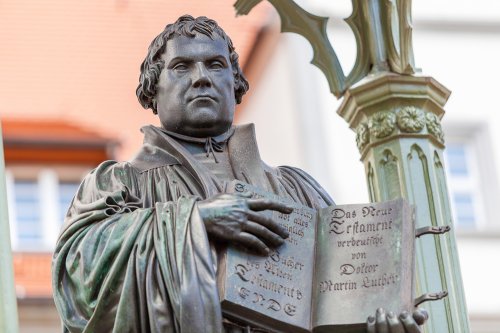 Luther - religious movements are shaped by politics as well as theology
Luther - religious movements are shaped by politics as well as theology
A Day of Full Revealment
Actually I don't blame Luther for his decision. I have done exactly the same otherwise no one would have come to this work in the beginning. Furthermore, a navi (prophet) needs to be equally aware of when to be silent as when to speak the revelations given him. The servant of Elohim (God) must be able to discipline his tongue even if he's bursting in his heart to share what Yahweh has shown him. And I've told you stories to illustrate this over the years. Today, though, is the beginning of the time of Yahweh's full revealment as we shall be learning later on in the Book of Revelation:
"Then I saw another malak (angel) flying in the midst of heaven, having the everlasting gospel to preach to those who dwell on the earth -- to every nation, tribe, tongue, and people -- saying with a loud voice, 'Fear Elohim (God) and give glory to Him, for the hour of His judgment has come..." (Rev.14:6-7, NKJV).
The Book of Revelation, as its book title suggests, is one such book of revealing. Yet its language is heavily couched to make it difficult for unbelievers and compromising, double-minded believers to fathom it. But to the pure of heart it may be readily opened with the help of good teachers able to understand the type of language being used.
Holding Us to Our Word
The Tanakh or Old Testament itself was only a partial revelation and as we see in the text I just read, we haven't get the fullness of the everlasting gospel yet, because the 'fullness' is only made known in times of judgment. Why? Because we tend to tenaciously cling onto our traditions when the going is 'good', for whatever reason - tribal loyalty, fear of upsetting the majority, fear of losing a salary if we are in paid ministry, fear of upsetting a spouse and rocking a marriage. Judgment tends to make us reassess our priorities and to weaken unreasonable resolve. We are irrational and compromising creatures, alas, a nature that Yahweh wants gone if He is ever to have us fully as truly His own. But He also wants to make us not only more productive for His Kingdom (as opposed to our private ones) but also, finally, to find shalom (peace) in our own souls. I will be the first to admit to being guilty of this very fallen behaviour. Desperate situations sometimes require desperate measures, a reason He retains trial and tribulation as a means of taking us to the place we say we want to go but in practice would rather not. He holds us to our word so be very careful when you prefess Yah'shua (Jesus) as your 'Lord and Saviour' or 'Master and Deliverer' because He will hold you to your word! And there are times you'll want to back-peddle on your word. Part of having integrity in all our dealings with Elohim (God) and with man is that we keep our Word unless a vow is so obviously not based on Scriptural truth. None of us should ever end up being as rash and fanatical as Jephthah (Judg.11) who ended up sacrificing his own beloved daughter because of a foolish promise he made.
 Irrationality's stumbling block is part of fallen human nature
Irrationality's stumbling block is part of fallen human nature
Fulfilling and Filling Up
Until Messiah came, the Torah was not full or complete - it was only a partial revelation which Yah'shua (Jesus), in part, came to bring to completion. He 'full-filled' it or 'filled it' up until it was 'full'. And yet the whole New Covenant truth was not known to man all at once, and still isn't, even if the saving essentials were all given to us in the days of the Messiah and His chosen apostles. I can't stress how important this truth is because so many people have had their faith shipwrecked by the unreasonable expectation that everything had been given by a certain point in history such as the resurrection of Messiah or the death of the apostles even if these were very important junctures indeed. Some fanatical Christians fon't believe there is any truth outside the Bible or that more light and truth have yet tob be revealed, to the point they won't study anything outside the Protestant canon. The identity of the world's Messiah was indeed established by the time He ascended to Heaven and the core salvational, apostolic doctrine was indeed established by the time John died. No doubt about that.
The Need for Ongoing Revelation
But the Gospel of the Kingdom clearly is an ongoing revelation - if it were not then Luther and others would not have backtracked in order to ensure the safety of their work. Honestly, who here can tell me how the earth will be run during the Millennium? At the present level of our knowledge, eveyone would go off and uniquely intrepret how it's government should be and you would end up with as many theocratic systems as there are denominations today! Come on, be honest! Who 100 per cent knows how the Messianic Community is to be governed? If they didn't in the 2nd century, then should we expect a fuller resolution in the 21st? At least there were probably less than a dozen factions then - today there are onwards of 32,000! So we do need continuous revelation and at some poinmt we're going to need apostles of the callibre of Paul again to provide that.
Reasons for Creeds and Man-Made Traditions
Before we start 'filling up' the Besorah (Gospel, Good News) for people, then, we must ensure we have the essentials in place and guard that with our lives for this is precisely what Satan wishes to undermine. That is what the second generation was most concerned about before all the complex creeds started appearing which unfortunately, in some cases, simply enthroned new man-made traditions. This was the inevitable result when Greek philosophy (Neoplatonism) was fused with the Gospel. Fear and a desire for control created the Jewish Talmud, and fear and a desire for control created most of the Christian creeds, and all done, no doubt, with the best of intentions most of the time. However, we all know where good intentions can sometimes, and do, lead, and it's usually a slippery slope. So the earlier and the closer to the apostles the early writers and their writings we can get, the better as far as doctrinal purity of the essentials is concerned. And really I'm only interested in the essentials today so that we can maintain unity.
Problems With Ignatius's Epistles
Last week I said that we would continue with an examination of the letters of Ignatius in our study of earliest Christianity relative to the teachings of Christ in chapters 2 & 3 of the Book of Revelation. I mentioned also that there were longer and shorter versions of these letters and that the longer versions are, beyond question, forgeries from the 4th century. What I did not know last week - and here you will, I hope, forgive me for my omission - is that there are even shorter versions of these 'short' versions in Syriac, but not of all seven of them, only three: letters to the Ephesians, Romans and Bishop Polycarp of Smyrna. This makes the entire 'Ignatian' and 'Pseudo-Ignatian' collection number some 19 documents!
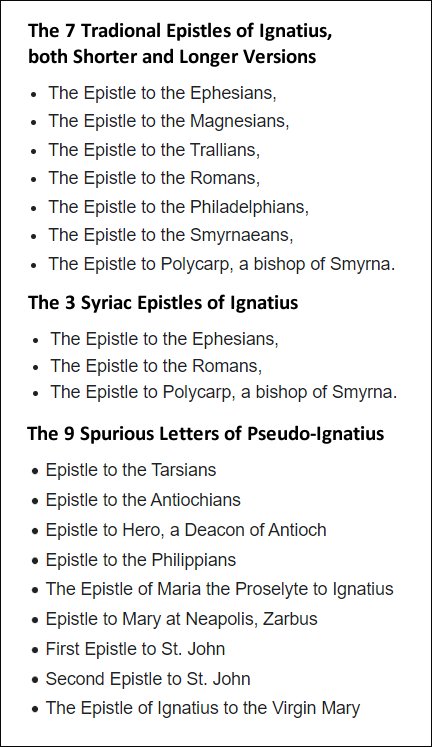
Who Created What and Why?
The problem then becomes which, of any, of these three Syriac epistles are the genuine letters of Ignatius, which then became enlarged by a Greek writer, and how many more were created (and by whom), if we are to accept that the so-called seven 'shorter' versions are, in fact, genuine. Then there are the questions as to who enlarged these 'shorter' (in reality, mid-sized) versions in the 4th century and why? What, then, of the shorter Syriac examples? Some scholars have suggested that the Syriac versions are simply later summaries of three of the original seven, and then, why only three of the seven (assuming there were originally seven). And that's another worry (for me, at any rate) because whilst the Syriac text flows better, at places there seem to be missing chunks.
Serious Doubts About Even the Shorter Versions
Given that so many forgeries of Ignatius' exist, including an alleged correspondence with the Virgin Mary (and her written reply), in addition to the seven 'shorter' and longer versions, I think we need to tread very carefully indeed. Given all the doctrinal controversies that raged in the 2nd and 3rd centuries which became so heated at times that dishonest believers were willing to forge, modify, or substantially add to, these letters of Ignatius, we can at least partly answer the 'why' part of our question. But they did, to their disgrace and to the disgrace of 2nd and 3rd century Christendom, and we must own up to it as part of a collective responsibility for all those naming the Name of Christ if we are to retain any semblance of integrity. Forgers like the expanders of Ignatiu's letters even went so far as to make up whole gospels using the names of others of the apostles to lend authenticity to them. So I do not want to be dogmatic about anything that is uncertain and right now I am uncertain as to what is, and isn't, genuine, of these three collections of writings bearing Ignatius' name.
One Motive of the Forgers
As I have dug more and more into these documents it has been very, very clear that there was a powerful group or sect within that wanted the Messianic Community (Church) to be run on the lines of an absolute monarchy but without the safeguards such a system would require for it not to eventually descend into tyranny - 'power corrupts, absolute power corrups absolutely'. They wanted the Bishops to have absolute power and authority and they were willing to change historical documents to make it look as if the apostles agreed with that position. Just reading through the longer versions of Ignatius' seven letters and you will see that the writer(s) were utterly obsessed with winning the argument for their side. Someone was dead keen to exercise absolute power. It has all the hallmarks of a later institution trying to legitimise itself politically and willing to be dishonest to accomplish its goal.
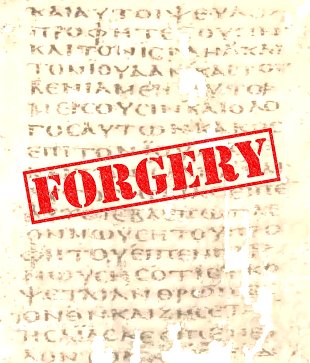 Early Christianity is awash with
Early Christianity is awash with
forged and fake documents
The Bane of Ecclesiastical Politics
That does not mean, though, that the Bishop's weren't given a special authority, it just means it wasn't unconditional. The Kingdom of Heaven isn't a democracy, after all, even if the consent of the governed is important. There were checks and balances - accountability structures - which a major faction clearly did not want because they knew they would neither be liked nor wanted by the majority. For that reason I have put the brake on even the shorter versions of Ignatius which I don't think now are completely authentic in their present form. That is not to say all of their contents have been manipulated by unscrupulous persions, but suffice to say that in its present form it is very 'convenient' for Catholicism's and Eastern Orthodoxy's claims to ecclesiastical and doctrinal authority, especially in respect of the eucharist and mass, and their hostility to some aspects of Torah.
Changing the Sabbath Twice
Scholars have been aware for sometime now about the 2nd and 3rd century controversies such as the Sabbath. It's a fact that the emerging Greek Church pushed for the replacement of the Sabbath with the 'Lord's Day' (Resurrection Day). It is also a fact that for a number of years a compromise was reached between the original Torah-obedient believers and the 'New Position'. And that compromise was that both the Sabbath and the Lord's Day be observed back-to-back. Learning about this initially confused me when I was young in the ministry and there was a time I suggested that perhaps we should observe both too, though we never did. In reality, this 'double act' was just a transitional time in the general apostacy that was underway, a kind of spiritual 'multiculturalism'. (You may remember I spoke of the clash between Passover and Easter in the 2nd century in a recent sermon in this series).
From Creation Sabbath to Sunday-Alone
Indeed the sabbath issue is a complex one for it began as the Biblical Luni-Solar Sabbath, mutated into the 7th Day Roman 'Sabbath' of modern Judaism and Christian sabbatarianism (Saturday, the Day of Saturn), went through a phase of the church observing both the 7th day Roman 'Sabbath' (Saturday) and the Roman 'Lord's Day' (Sunday, the Day of the Sun). Finally even this mutated 'Saturday sabbath' was discarded, and the Eastern Greeks and Western Romans both at length decided to become 'Sunday-alone', making the Latinised 'Lord's Day' or '8th day' as it's sometimes called, the only weekly day of worship. By calling it the '8th day', incidentally, they introduced an air of mysticism into their apostacy. I'll not get into the politics of all of this but basically it was done because the emerging Roman Catholic Church wanted to make a clean break between Christianity and Judaism in order to 'virtue-signal' to the Roman Emperor for acceptance for you will remember that at times the Jews of the Empire were wont to riot. But that's another story for another day and we have already talked at length about Messianic and Jewish tensions in the Roman Empire.
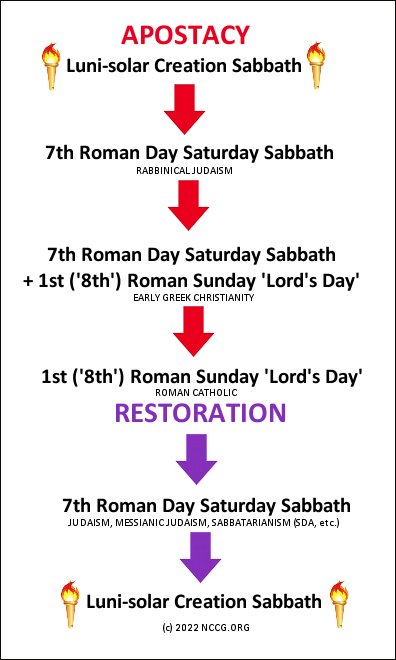 Evolution of the Saturday 'Sabbath' & Sunday 'Lord's Day'
Evolution of the Saturday 'Sabbath' & Sunday 'Lord's Day'
Putting Ignatius on the Back Burner
Again, let me note, that the extra-short Syriac versions flow much more smoothly than either the shorter or longer Greek versions suggesting perhaps that the Greek has been messing with the Syriac and that the Syriac may well be both original and reliable, though we can't be sure since the copies of the Syriac we have are not as old as the Greek texts. For now that is my opinion and I think it best to leave it at that until I can research the Syriac more thoroughly and come back to you on that later, if I may, hopefully next week. So I am putting Ignatius on the back burner, as it were, for now though I feel you should be aware of this early Bishop.
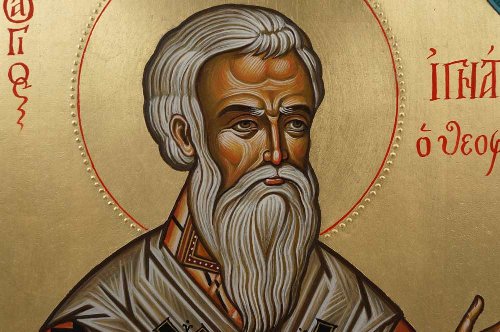 Bishop Ignatius of Antioch - how many of his letters are authentic?
Bishop Ignatius of Antioch - how many of his letters are authentic?
Clement, an Older and More Reliable Post-Apostolic Father
But we can do even better than Ignatius with a slightly later writer than him, Polycarp, the then Bishop of Smyrna, whose writings appear to be untampered with, to whom Ignatius also wrote personally in the way Paul wrote to Timothy and Titus, but, if I may, I'll leave him to next week too. However, there is an even more interesting and useful sub-apostolic letter, and one that has always drawn me the most of all of them, and it is that of the First Epistle of Clement, Bishop of Rome, who wrote to the Corinthian qodeshim (saints, set-apart ones), and clearly has continuity with Paul's two known letters to the believers of that place on the Greek mainland. It is, moreover, dated to as early as AD 96, which is even earlier than Ignatius by at least 20 years, at the end of the first century, making it all the more valuable. Since we are pretty certain now John wrote Revelation and 1-3 John in the early to mid-90's, it looks as though John had not been long dead when Clement wrote to Corinth, perhaps a year or two, or even just a matter of months, later. (There is a picture of Clement, taken from a Greek icon, at the head of this article).
The Importance of the First Sub-Apostolic Fathers
So we're not going to get any closer to the apostles and their writings than Clement, thus making his witness very important indeed. Anyone later than Polycarp I tend to be more than a little suspicious of because of the way in which change tends to accelerate and then become fossilised tradition. Add to that the fact that Clement was the third Bishop of Rome after Linus and Anacletus (Cletus). And though Peter certainly visited Rome he was never its Bishop, thus undermining one of the claims to authority of the Roman Catholic Church [1], a reason they no doubt made an appeal to later forged documents to authenticate them. It's why Messianic Evangelicals take Clement, the authentic Ignatius and Polycarp, the first sub-apostolic fathers, very seriously indeed because they help us establish true doctrine and equip us to refute the false. As secondary witnesses to doctrinal debates amongst denominational Christians and Messianics, they are to be greatly treasured. So I now present them to you as important exhibits of historical truth.
Pursuing Historical and Scientific Reality
As an amateur historian, I love material that can make history become clearer and more alive. We can get into the minds and hearts of the earliest believers and know exactly what their religion consisted of. I love the saying of Philip K. Dirk who said that "reality is that which, when you stop believing in it, doesn't go away" for we must be true to that reality which everyone's senses is forced to admit. That's why the earth remains a sphere and flat-earthers will see that it is so when their faith in flat-earth finally crumbles. It's why matter is solid and not an illusion or 'maya' as New Agers claim, in spite of the huge amounts of space in matter - between the atoms and between the subatomic particles. Space is not, in any case, 'empty'. That is why we must relentlessly do good science and good history even if it means ploughing our way through mounatain-loads of lies and hald-truths to do so.
The Corrobatory Evidence of the Earliest Sub-Apostolic Fathers
One thing is clear: these earliest post-apostolic writers are totally immersed in the Gospels and the writings of John (who lived among them for decades), Peter, and Paul who visited (and planted) most of the congregations in Greece and Asia Minor, and John especially in Anatolia. Last week we were talking about how various officers in the Messianic Community (Church) evolved and made mention of the Bishops and Elders (Presbyters) who were initially one and the same. We know the two eventually divided into seperate offices once the last apostle (John) died. But was this the original plan? Who is right of the Presbyterians/Congregationalists and the Episcopalians? - those who believe the highest office in the post-apostolic era is the Pastor or Presiding Presbyter (Elder), and those who believe it is the Bishop, respectively? We can now answer that definitively because we now know, with 99 per cent certainty, the mind of the apostles thanks to their pupils who corroberate one other.
Clement Testifies of Apostolic Leadership Structures
Towards the end of his epistle, Bishop Clement of Rome makes mention of how in the earliest days of the apostles, converts were appointed as "bishops and deacons for the future believers", adding that this was "no innovation, for, a long time before the Scripture had spoken about bishops and deacons...it says: I will establish their overseers in observance of the Torah (Law) and their ministers in fidelity" (para.42). In other words, as I suggested to you last week, Bishops were Overseers, along with the Deacons, and were established to be so by the apostles no less, at least by the time John died, and in accordance with the Torah (Law), for the governance of the Messianic Community (Church) for the post-apostolic period. Clement says:
"Our Apostles, too, were given to understand by our Master Yah'shua the Messiah (Jesus Christ) that the office of the Bishop would give rise to intrigues. For this reason, equipped as they were with perfect foreknowledge, they appointed the men mentioned before, and afterwards laid down a rule once for all to this effect: when these men (bishops) die, other approved men shall succeed to their sacred ministry [as bishops]. Consequently, we deem it an injustice to eject from the sacred ministry [in Corinth specifically] the persons who were appointed either by them, or later, with the consent of the whole Messianic Community (Church), by other men in high repute and have ministered to the flock of Messiah (Christ) faultlessly, humbly, quietly and unselfishly, and have moreover, over a long period of time, earned the esteem of all. Indeed, it will be no small sin for us if we oust men who have irreproachably and piously offered the sacrifices proper to the episcopate (bishopric). Happy the presbyters (elders) who have before now completed life's journey and taken their departure in mature age and laden with [spiritual] fruit! They, surely, do not have to fear that anyone will dislodge them from the place built for them. Yes, we see that you removed some, their good conduct notwithstanding, from the sacred ministry on which their faultless discharge had shed luster" (para.45).
Bishops Created to Replace Apostles after Their Deaths
You see, there had been a sort of ecclesiastical coup d'étate in the Corinthian congregation - the younger ones - the rising second generation - had deposed their Bishop and some presbyters (elders) at Corinth! Accordingly, the letter of Clement to the Corinthians is extremely important in our understanding of the apostolic intent in their provision for the ongoing life of the Messianic Community - the second generation. Unlike Ignatius' hurried pieces, 1 Clement is long and carefully crafted, and the influence of Paul strongly evidenced. You'll find it on our website. And aside from the mythical phoenix being used by Clement as a metaphor for the resurrection, I see no reason why this cannot be accepted and used as secondary scripture. The spirit and doctrine is the same as the New Testament. It's importance lies for our purposes today in establishing the method of apostolic succession: bishops were ordained by the apostles to replace the apostles after their death, men of spiritual integrity.
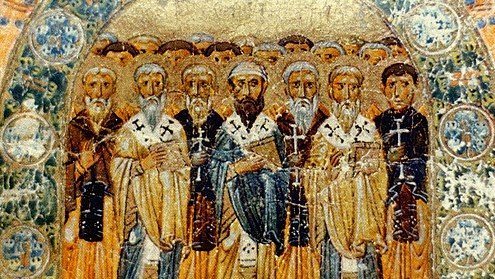 Early Bishops and Deacons - 11th century illustration
Early Bishops and Deacons - 11th century illustration
Qualifications of the Bishop
And what were the "sacrifices" these Bishops were called to offer that Clement speaks of? Not, as the later Roman Catholic Church would insist, the 'Eucharist' or 'Mass', nor the old Levitical system of animal sacrifices, but rather the sacrifice of their souls, as the psalmist testified:
"The sacrifices of Elohim (God) are a broken spirit,
A broken and a contrite heart --
These, O Elohim (God), You will not despise" (Ps.51:17, NKJV).
A Litmus Test of a True Bishop in Christ
These fatherly sacrifices made by the Bishops should inspire all the qodeshim (saints, set-apart ones) to live lives of holiness and purity, again as attested by the psalmist:
"Yahweh is near to those who have a broken heart,
And saves such as have a contrite spirit" (Ps.34:18, NKJV).
Thus we have another litmus test of authentic salvation verses the false type - the truely saved, spiritually regenerated, born-again ones are, like Moses, humble, for as it is written in the Torah:
"Now the man Moses was very humble (or "meek" - KJV), more than all men who were on the face of the earth" (Num.12:3, NKJV).
In other words, he had a broken heart and a contrite spirit. He was lowly, not arrogant or proud, not overbearing or monarchical, but "poor in spirit", and to such Yah'shua (Jesus) declares, belongs the Kingdom of Heaven (Mt.5:3, NKJV).
Clement Endorses Torah
This is the hallmark of Elohim's (God's) people, is it not? Humility in love and truth. Moreover, Clement endorses the Torah (Law) most emphatically, making note that "Torah (Law)-respecting men were persecuted of course, but only by Torah(law)less men. They were put in prison, but only by unholy men. They were stoned to death by condemners of the Torah (Law)" (para.45).
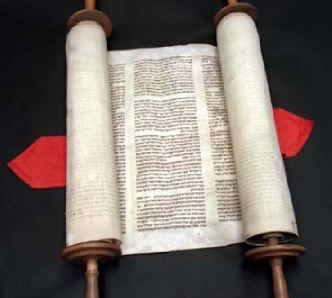 Clement endorsed the Torah
Clement endorsed the Torah
All 'Church Fathers' Must Be Judged Against the Apostles
Who will deny that this is not a most precious spiritual gem preserved for us from the apostles by the third Bishop of Rome? But also notice how Clement underlined the importance of the Law or Torah too - he did not preach doing away with the Law, as pseudo-Ignatius does (the forgery of Ignatius) which he would have done had Paul actually said so, because this is a faithful talmid (disciple) of the Apostle to the Gentiles, appointed to his office in the apostolic manner. What later generations of Bishops or 'Church Fathers' may say and do must be judged on their own merits but this man is too close in time to the original apostles - the closest we know of, in fact - to be ignored or casually dismissed. So whatever Paul meant by the 'Judaisers', it has nothing to do with a negative attitude toward the Torah itself.
Judaism and Yahwism are Not the Same Thing
I make mention of this to you purposefully because of the negative things Ignatius said about the 'Judaisers' so as to impress your mind that a clear distinction is to be made between those who adhere to the Torah in the New Covenant and to the kind of "Judaism" that Paul once participated in as a zeaolous follower and teacher of Rabbinicism or the "tradition of the Elders" (Gal.1:3-14)) and with which he, Paul, after his conversion, like Ignatius, had to contend against in new converts from Judaism and with which we too must contend. Here, then, is an issue which we may even more firmly resolve today for both Evangelicals and Messianics, if they will but listen and prayerfully consider, and it is this: Judaism and the religion of the Tanakh (Old Testament) - the authentic faith of Yehudim or Judahite Yahweh-worshippers, though having some doctrinal, practical things in common, not to menion a shared vocabulary - are two entirely different things. They're different religions with different spirits. One is the "Synagogue of Satan" (Rev.2:9; 3:9) and the other the Kehilah or "Congregation of Yahweh" (Num.16:3; 27:17; 31:16; Dt.23:1-3; Josh.22:16-17).
Two Extremes Leading to Apostacy
See here! We are dealing with the same two heretical extremes today as they did back then: there were then, as there are today:
- 1. Those who pursue something akin to 'hyper-grace' (e.g. Calvinists and others) who reject the Torah or Law altogether, into which category many Protestants fall; and
- 2. There were those then, as today, who wished to fasten to the New Covenant Torah not only the fulfilled Levitical, Aaronic or Mosaic ceremonial law of animal sacrifices with its priesthood (including, and especially, circumcision), but who wish, and still wish, to add all the false, man-made Pharisaic, Talmudic or Rabbinical traditions too.
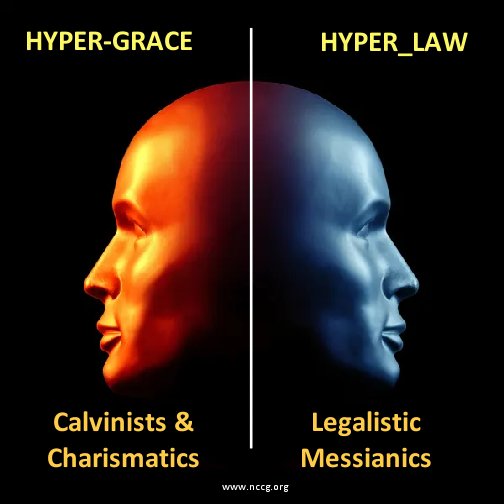 The two heretical theological extremes
The two heretical theological extremes
The Judaising Heresy Explained
The latter of these two constitute what the Scriptures call 'Judaising'. And the major ordinance of the Old Covenant Torah was circumcision, the entry by ordinance into pre-messianic Israel but now replaced by complete water immersion or baptism as the outward ordinance of entry into the new Koinonia and Kingdom of our Elohim (God). Much of the contention between Evangelicals and Messianics is over a misunderstanding of what New Covenant Torah actually is - what is good, acceptable and eternal, what was temporary and preparatory (and passing away), and what was added on as the apostate "tradition of the elders" (Mt.15:2; Mk.7:3,5) and others or "the traditions of men" (Mk.7:8). The same former Pharisee converts who wished to force on new converts the heavy burden of the false 'oral Torah (Law)', so-called, along with elements of the fulfilled and superceded (replaced) ceremonial Torah (Law) of the Old Covenant in Paul's day, were evidently still around in the early 2nd century and still pressing for the same thing in Ignatius' day. Hence the sub-apostolic backlash. For had they succeeded, apostacy in the Body of Christ would have been hastened in the direction of Messianic Judaism leading to a schism in the Body. But as it was, it was the other extreme that in the end was the cause of Christendom's fall, that of adding pagan doctrines and practices out of which evolved Catholicism, Eastern Orthodoxy, and Protestantism.
A Battle on Four Fronts!
The battle today, as it was then, has always been on more than one front, namely:
- 1. Against the Judaisers pressing for the false 'tradition of the elders' along with fulfilled ceremonial laws like circumcision and the Levitical system of animal sacrifices (like many of today's Messianics);
- 2. Against the lawless, fatalist 'ultra-gracers' (like today's agency-denying Calvinists) and others;
- 3. Against the Gnostics pursuing a false salvation route viâ esoteric knowledge (like today's Mormons); and
- 4. The Catholic-Heathen hybrid churches who have added paganism to the Besorah (Gospel, Good News).
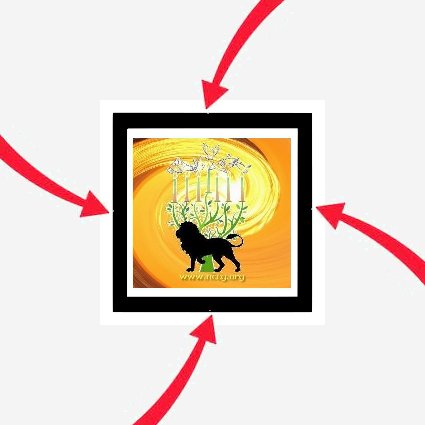
How to Deal With Schismatics and Infighting
Clement, like Ignatius, reminding the Corinthians of Paul's own words, warns strongly against infighting, factionlism, and schism (para.47), which is a menace in every age. I cited the example of Euodia and Syntyche from the Philippian assembly last week. Clement is most emphatic about how we are to deal with schismatics:
"Now, then, who among you is noble, who compassionate, who is full of charity (love)? Let him say: 'If I am the cause of sedition and strife and schism, then I depart; I go wherever you wish; I do whatever the majority enjoins: only let the flock of Christ have peace with the appointed presbyters (elders). He who acts thus will win great glory for himself in Christ, and every place will welcome him; for the earth and all that is in it are the Master's. Those who live as citizens of Elohim's (God's) Kingdom -- a life that never brings regrets -- have acted thus and will act thus" (para.54).
The Proper, Compassionate Way to be Corrected and to Submit
This, brethren and sisters, was the mind and heart of the first believers as well as the second generation but, alas, it is not so among this postmodernist generation which believes in uncritically embracing everyone and anything because everyone supposedly has their own 'personal truth'. The 'church' is now so broad that it has become a whore, a reason it must be severely disciplined and cleansed - and that means separating out the submitted Remnant Bride from the mass of disobedient believers by calling on them to depart. Our attitude should therefore be, as it was of those of Paul's, Clement's, Ignatius' and Polycarp's day:
"Let us, too, therefore, pray for those who are guilty of some fault, that meekness and humility may be granted them, and incline them to submit -- not to us -- but to the will of Elohim (God); thus our compassionate remembrance of them before Elohim (God) and the qodeshim (saints, set-apart ones) will bear perfect fruit for them. Let us, beloved, accept correction (e.g. 2 Tim.3:16; 4:2), which no one must take in bad part. A reproof which we administer to one another is honorable and extremely helpful, for it unites us to the will of Elohim (God). For Holy Writ says as follows: Severely has the Master chastised me, but He did not give me over to death. For, him whom the Master loves He chastises, and He always scourges the son whom He takes to His heart. For, the good man, it says, will chastise me with mercy and reprove me; but let not the oil of sinners anoint my head" (para.56).
 The Remnant Bride is characterised by submissiveness
The Remnant Bride is characterised by submissiveness
When Believers are Satisfied With Their Delusions
The liberalised church (oftentimes even those within it who call themselves 'conservative') is so far removed from this apostolic mindset, so hostile to any sort of correction or discipline, that it has not only grown weak, flaccid and useless but has become a positive menace to evangelism and discipling. It is no longer a part of the Kingdom of Elohim (God) but does not know it...or does not want to know it because it is satisfied in its own delusion (2 Thes.2:11). Easily offended (Mt.13:57; 15:12; Mk.6:3; Jn.6:61), quick to condemn those who do not agree with all its disparate viewpoints, and disposed to sinful living like the Nicolaitans of old (Rev.2:6,15), today's Christendom is a pale reflection of the Messianic Community of the first two or three centuries - so pale as to be afflicted with terminal spiritual anaemia. Reviving that carcass, as many are trying to do, is a task of the utmost folly and futility, for you can no more put 'Christ' into that kind of 'Christ'ianity than you can put 'Christ' back into 'Christ'Mas.
Better Little and Honourable Than Boastfulness and Pride in Greatness
Yahweh wants reformation not deformation, restoration not deconstruction, holiness not promiscuity, truth and reality not fantasy. Will He accept any compromise? Never. You either do it His way or you leave the Messianic Community (Church), as Clement, the first Bishop of Rome, insisted:
"You [young Corinthians], therefore, the prime movers of the schism, submit to the presbyters (elders), and, bending the knees of your hearts, accept correction and change your minds. Learn submissiveness, and rid yourselves of your boastful and proud incorrigibility of tongue. Surely, it is better for you to be little and honorable within the flock of Christ than to be esteemed above your deserts and forfeit the hope which He holds out" (para.57).
 Better to be little & honourable than over-esteemed & lost
Better to be little & honourable than over-esteemed & lost
Touch Not the Lord's Anointed?
How eloquently Clement writes and how very true! Shall we submit to lawless spiritual youths? Certainly not! Be they individuals, churches or whole denominations, we shall not bow the idolatrous knee to them. What, then, if the presbyters or elders apostacise? What should be do then? Just take their abuse? Shall we submit to them simply because of their office? Let's be clear about this: if they are plainly and unambiguously in apostacy, no, for these are not elders in the Kingdom of our Elohim (God) but the kingdom of man. But we must be absolutely sure because it is a grave step to oppose an appointment of Yahweh if indeed it was Yahweh's appointment. And you know how apostate charismatics like Benny Hinn and Kenneth Copeland use the whipping boy to protect themselves from doctrinal scrutiny and accountability by threatening people, taking passages about kings out of context and applying then to themselves. Such you simply need to rebuke and get out, handing them over to Yahweh for judgment.
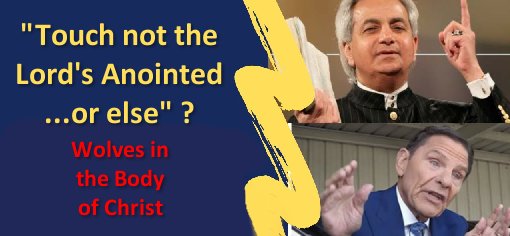 You do not have to follow or obey false leaders
You do not have to follow or obey false leaders
Using the Constitution
Misbehaving Elders, or Elders teaching false doctrine about the essentials, are to be brought before a Bishop's Court, in a proper and orderly manner, which a proper Constitution should provide for, as does the Messianic Evangelical 9th Article. A man in error is one thing, but one holding an office must be handled in the proper manner and not by means of lawless a coup d'état as the Corinthians did. Rather, submit gladly to those presbyters who hearts are broken and whose spirits are contrite. If the church or messianic assembly has no just and scripturally-based mechanism for disciplining errant leaders, then that congregation is unsafe for the flock.
The Tough Job of the Apostle Paul
I can only imagine the heavy burden of responsibility that lay on Pauls' shoulders in having to deal with all the issues I have raised today. Many false anti-paulist messianics have demonised him and accused him of being a false apostle because they have not understood that he was repositioning the Torah under Messiah, and not abolishing it in Messiah! Many are the messianic heresies in our day, alas, adding to the pile of heresies that Christendom has inherited through the orthodox churches because of these early 2nd and 3rd century doctrinal conflicts. So I take my hat of to Paul, hard though he is admittedly for us to sometimes understand, but then those of his day had the same problem, not because he was wrong but because the "untaught" in every generation find hard to grasp deeper spiritual matters (2 Pet.3:16). Which again brings us back to the importance of qualified teachers in the Messianic Community (Church) (Eph.4:1). And yes I didn't really start to understand Paul properly until I metaphorically sat at the feet of a couple of great teachers, one a Scottish Presbyterian (James S. Stewart) and the other an Anglican (N.T.Wright). So don't envy Paul, he had a really tough job, both reaching the brainwashed adherents of Judaism and the fried minds of the pagans. He re-jusxtaposed the Torah, neither leaving it where it was in Judaism or removing it at the behest of lazy ex-pagans.
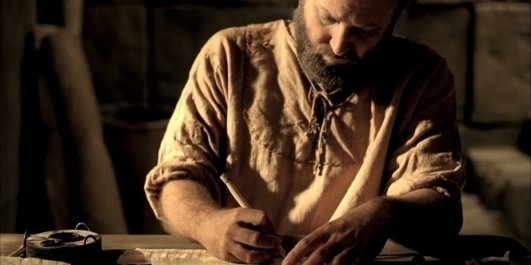 The apostle Paul, of blessed memory, greatly misunderstood and abused
The apostle Paul, of blessed memory, greatly misunderstood and abused
Why Bishops Instead of Apostles?
I'd like to end today by answering an important, if difficult, question: if the apostles made no provision for a continuation of the apostolic line after the death of John, but rather appointed Bishops, then why is it that we, as Messianic Evangelicals, speak of the importace of the restoration of apostles in the very last days? To begin with, the original 12 apostles (minus the traitor Judas and plus the faithful Paul) can never be replaced. Their apostleship is unique in as much as they were eye-witnesses to the life, works and teachings of the mortal Messiah. They, and they alone, will, as Scripture says, judge the Twelve Tribes of Israel (Mt.19:28; Lk.22:30). Whoever comes in the authentic office of an apostle in these very last days can never claim to have done that. Thus until this end-time restoration work, Yahweh clearly ordained that the Messianic Community (Church) be led by Bishops or Collective Overseers over groups of congregations, each led by a Pastor, in a particular area.
The End-Time Messianic Body is 'Episcopalian'
So the Messianic Community became episcopalian (as opposed to the American Anglican denomination of the same name), no two questions about it. That the bishops themselves eventually apostacised, acruing power they were not entitled to and at length taught false doctrines too, is not denied, but is simply a fact of history, which Yahweh foreknew would happen. And had He chosen a line of apostles to continue after the original twelve, there is no doubt they would have apostacised too.
The Roman Apostacy
As we also know, the Bishop of Rome eventually assumed a rôle as 'pope', compounding and provoking the general apostacy by introding more and more false doctrines, culminating in the last two centuries with such false teachings as the infallibility of the pope when pronouncing ex cathedra, the perpetual virginity of the Virgin Mary, the assumption of Mary into heaven without tasting death (she died in Ephesus in Anatolia under John's watchcare), and (in all but name) the Virgin Mary as Co-Redemptrix or Co-Savior with Christ. And the fact that the faked letters of Ignatius speak of episcopal monarchism does not validate the claims of the Roman Catholic Church to exclusive apostolic authority, for I happen to know that many Protestants have been converted to Catholicism and Eastern Orthodoxy because they believed in the Ignatian forgeries I mentioned earlier. Hence the need for great, great care in establishing the actual historicity of ancient documents or not.
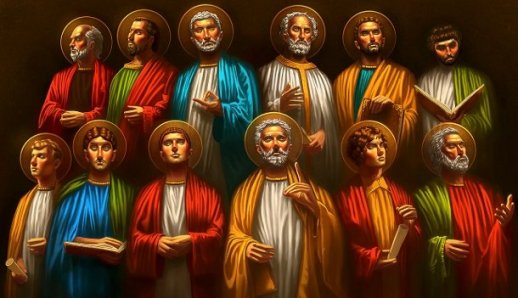 The original 12 are of an order of authority above all end-time apostles
The original 12 are of an order of authority above all end-time apostles
Conclusion
Next week I want to end this three-part series, Between the Present and the Future in which we'll look at the Syriac versions of Ignatius' letters in passing and then talk about who and what the end-time apostles are in conjunction with their rôle to be the patriarch-heads of the restored Twelve Tribes of Messianic Israel and the Final Gathering. Then, the following day, it will be the biblical New Year and the start of a new spiritual season. So until then, may the grace of our Master and Deliverer, Yah'shua the Messiah (Jesus Christ), continue to be with you and with all those now starting to come up to this work again. Amen.
Continued in Part 17
Endnotes
[1] See Alexander Finlay, The Rock on Which the Church is Built
Acknowledgements
[1] N.T.Wright & Michael F.Bird, The New Testament in Its World: An Introduction to the History, Literature, and Theology of the First Christians (Zondervan Academic, Grand Rapids, Michigan: 2019)
[2] Eerdmans, ed. David Noel Freedman, Dictionary of the Bible (Eerdmans, Grand Rapids, Michigan: 2000)
[3] Tom Wright, Revelation for Everyone, Book of Revelation (SPCK, London: 2011)
[4] David Pawson, Unlocking the Bible: A Unique Overview of the Whole Bible (Collins, London: 2007)
 Click the image for the whole Series
Click the image for the whole Series

 V332
V332
|


